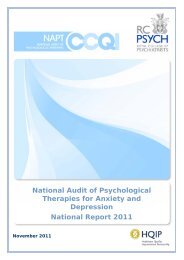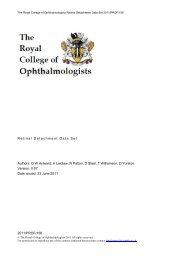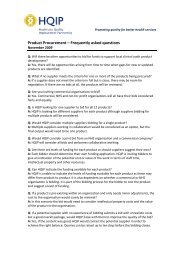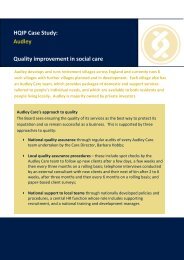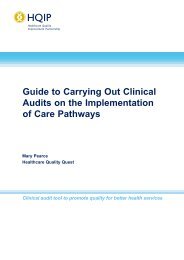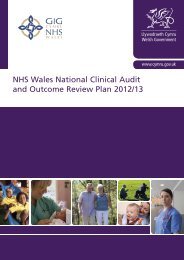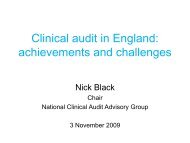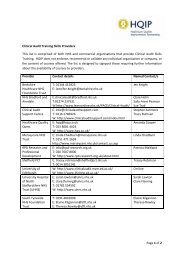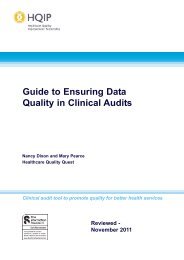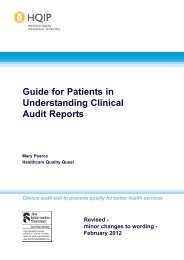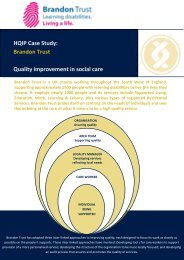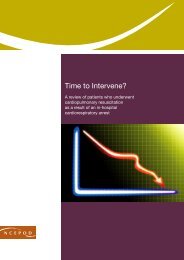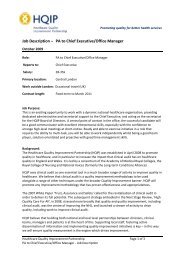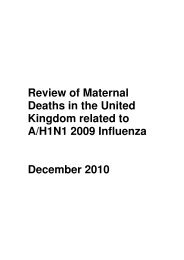Good Governance Handbook - HQIP
Good Governance Handbook - HQIP
Good Governance Handbook - HQIP
Create successful ePaper yourself
Turn your PDF publications into a flip-book with our unique Google optimized e-Paper software.
the beginning of a meeting.<br />
If a board member realises they have failed to declare something, they should declare<br />
as soon as possible after the relevant meeting. Baroness Rennie Fritchie, the ex-<br />
Commissioner for Public Appointments, and Malcolm Leary suggest the following as a<br />
conflicts protocol: 40<br />
1. Declare the conflict but continue to participate in the discussion.<br />
2. Declare the conflict and abstain from discussing and deciding a particular<br />
issue.<br />
3. Delegate your function e.g. chairing, on a temporary basis.<br />
4. Resign – either before you become conflicted or once a conflict arises.<br />
Staff are also required to declare interests and act appropriately. For example, any<br />
staff who are in contact with suppliers and/or contractors, in particular those<br />
authorised to sign purchase orders, are expected to adhere to professional standards<br />
of the kind set out in the Ethical Code of the Chartered Institute of Purchase and<br />
Supply. 41<br />
6.10 Scrutiny by Employees<br />
The Public Interest Disclosure Act 1998 was introduced to protect employees who are<br />
worried about wrongdoing where they work and want to ‘blow the whistle’ or more<br />
formally described as ‘making a disclosure in the public interest’. The Act applies to<br />
most employees including health, local authorities; a police or fire authority; or a<br />
related body and includes those employed on a temporary basis or through an<br />
agency.<br />
Someone making such a disclosure must do so in good faith (even if later it turns out<br />
to be untrue) and must believe that at least one of the following tests are met:<br />
• that a criminal offence has been or is likely to be committed<br />
• that someone is failing, or will fail, to comply with legal obligations<br />
• that a miscarriage of justice will occur or has occurred.<br />
The Act protects all employees, contractors, trainees or agency staff. The legal<br />
protection is that he/she can receive unlimited compensation. However, to gain the<br />
protection of the Act it is important to ensure that any whistleblowing meets the<br />
criteria of being a “qualifying disclosure” and must be to a legal adviser, employer,<br />
Minister of the Crown, or the relevant regulator, Auditor General of the NAO to<br />
whom any concerns about ‘the proper conduct of public business, value for money,<br />
fraud and corruption in relation to the provision of public services’ can be<br />
addressed. 42<br />
40 Baroness Rennie Fritchie, Malcom Leary, Resolving Conflicts in organisations: A practical guide for<br />
managers, 1998<br />
41 http://www.cips.org/aboutcips/whatwedo/codeofprofessionalethics/<br />
42www.direct.gov.uk/en/Employment/ResolvingWorkplaceDisputes/Whistleblowingintheworkplace/D<br />
G_175821<br />
www.good-governance.org.uk 31



